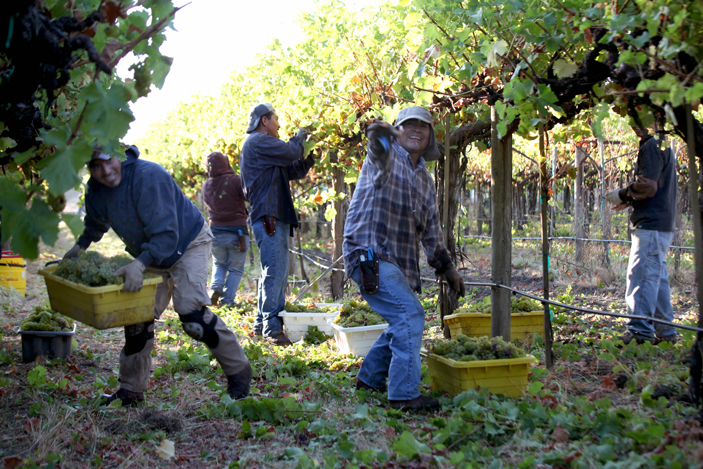 Repentance
Repentance Entries from July 1, 2020 - July 31, 2020
Cheap Words; Costly Repentance
 Friday, July 24, 2020 at 11:35AM
Friday, July 24, 2020 at 11:35AM  Words are cheap. It’s easy to tell someone what they want to hear. Deeds are costly, because we can only do one thing at a time. To do one thing is to say “no” to 10,000 others in that moment. To merely say something is to leave our options open: who knows what might happen next?
Words are cheap. It’s easy to tell someone what they want to hear. Deeds are costly, because we can only do one thing at a time. To do one thing is to say “no” to 10,000 others in that moment. To merely say something is to leave our options open: who knows what might happen next?
Tucked away in Matthew’s gospel (and only Matthew’s gospel, 21:28-32) is the short parable of two sons:
“What do you think? There was a man who had two sons. He went to the first and said, ‘Son, go and work today in the vineyard.’
“‘I will not,’ he answered, but later he changed his mind and went.
“Then the father went to the other son and said the same thing. He answered, ‘I will, sir,’ but he did not go.
“Which of the two did what his father wanted?”
“The first,” they answered.
Jesus said to them, “Truly I tell you, the tax collectors and the prostitutes are entering the kingdom of God ahead of you. For John came to you to show you the way of righteousness, and you did not believe him, but the tax collectors and the prostitutes did. And even after you saw this, you did not repent and believe him."
You can tell it’s a repentance story by the way Jesus connects it to John the Baptist’s ministry, which was all about repentance. But there’s a key moment before last verse. The first son “changed his mind” (v 29, and also 32) and then went out to work in the vineyard. This isn’t the normal word we associate with repentance, it’s closer to the idea that he changed his cares. It’s as if the very moment he said “no” it created a kind of anxiety that dogged his steps the rest of the day—until he simply headed out to the vines and started doing the work.
As in so many parables, perhaps Jesus invites us to read behind the lines. I began to wonder, “What kind of son blurts out ‘No’ but then lives out ‘Yes?’” And why didn’t the father try to correct the son immediately? And why does the second son so easily say “Yes” but so easily does his own thing without regard to either his father or his own words? Clearly there are at least two kinds of people in the small world of this story: people who lead with their feelings and those who cover their feelings with the “right words.”
The first son doesn’t want to go to work that day, and he doesn’t care who knows it. But something tugs at him. We don’t know how long the tug-of-war went on but we do know the result: the son does what the father asks. Not long after Jesus tells this story, we see Jesus in the Garden of Gethsemane telling his Father that he would prefer another path. From the many Biblical descriptions of that prayer in the garden we learn that it was powerfully charged with emotion; it was raw with honesty and struggle.
The second son knows exactly what the father wants to hear and says it immediately, even easily. Jesus leaves us to wonder whether the second son ever had any intention of going to work. Maybe he did; maybe not. Maybe he was on his way to the vineyard and fell prey to distraction or amusement. Maybe he knew from the start that he was going to stay home and play video games. Maybe the father knew it, too. (This is part of the beauty of parables: there are so many maybes!)
But Jesus has a definite purpose in the parable. His audience are the religiously-minded Pharisees, who were experts in saying the right things while doing the wrong ones. They were practiced in appearances. They were religious professionals. They were also among those who demanded the death of Jesus.
But just so we wouldn’t miss his meaning, Jesus jumps from the parable to real life. The tax collectors and whores of that culture know the tug-of-war. They care about what they say—and do. They are capable of feeling remorse and changing direction. The beauty of John the Baptist’s ministry was how he provided a way for those who were on the outside to find their way back into God’s kingdom: it was “the way of righteousness” (v 32). Remorse that leads to repentance means return and restoration. It’s the way back. In a chilling final application of the parable, Jesus pointed out that those who were practiced at saying the right things may be the very people incapable of feeling the right thing.
As with so many of the Lord’s parables, we are left to wonder which group we are in. It is a common weakness among Christians to mistake knowing the right answer for living the right answer. Life with God is never a written exam; it is always a practical one. Will I find myself playing religious games with religious friends, or will I find myself among God’s true people, doing God’s good work?
Busking on the Metro, and Internet Crickets
 Wednesday, July 15, 2020 at 03:47PM
Wednesday, July 15, 2020 at 03:47PM  Over the decade I've been blogging I’ve noticed a disturbing trend: we would much rather talk about big social topics than about ourselves. When I post something on the church at large, the number of visitors to this site soars and comments pour in. Everyone rushes to the table where the state of the church is sliced, diced, and analyzed in detail. Or in another vein, with the mere mention of a Christian celebrity I can drive hundreds more visitors to my site.
Over the decade I've been blogging I’ve noticed a disturbing trend: we would much rather talk about big social topics than about ourselves. When I post something on the church at large, the number of visitors to this site soars and comments pour in. Everyone rushes to the table where the state of the church is sliced, diced, and analyzed in detail. Or in another vein, with the mere mention of a Christian celebrity I can drive hundreds more visitors to my site.like a weaned child with its mother,
like a weaned child is my soul within me.
both now and forevermore. (~ Psalm 131, a psalm of David)
and renew a steadfast spirit within me.
or take your Holy Spirit from me. (Psalm 51:10-11)
Judgment: An Enemy of Repentance
 Friday, July 10, 2020 at 01:21PM
Friday, July 10, 2020 at 01:21PM  I have amazing superpowers, and plenty of them:
I have amazing superpowers, and plenty of them:
- On the freeway, from inside my own car, I can spot “idiots” by the way they drive. (And believe me, there are loads of idiots!)
- On social media, I can discern the tone of voice in a text, a Tweet or a Facebook post. If I’m watching a video, I can go beyond tone of voice and tell you the exact motivation of the person posting.
- While reading the New York Times I possess all the insight needed to instantly solve all the world’s problems (even though a reporter from the Times has never called me to ask my opinions).
You get the idea: my superpowers are a dazzling combination of mindreading and deep analysis. I’m a mash-up of Megamind and Mother Teresa.
Of course, the scripture doesn’t use the term superpower. It doesn’t look like Jesus is impressed at all:
Do not judge, or you too will be judged. For in the same way you judge others, you will be judged, and with the measure you use, it will be measured to you. Why do you look at the speck of sawdust in your brother’s eye and pay no attention to the plank in your own eye? How can you say to your brother, ‘Let me take the speck out of your eye,’ when all the time there is a plank in your own eye? You hypocrite, first take the plank out of your own eye, and then you will see clearly to remove the speck from your brother’s eye. (Matthew 7:1-5)
If you’re into being in control, being a judge is a great deal. Think of a courtroom: judges do not repent, defendants do. The judge sits above the situation. In fact, the judge sits above everyone else in the room! Everyone else in the room wants to win the judge’s attention and approval. Ultimately, the judge gets to decide who gets to say what, and how much they get to say. Argue with the judge you will be met with a contempt of court citation—which you cannot challenge or contest. It is final.
The habitual practice of judgment is an enemy of repentance. As soon as I cast myself in the role of judge, I have excused myself of the need to repent, because after all, it’s all about me. Come to think of it, only three kinds of people wear flowing black robes: graduates (who think they know more than they do), judges (who hold all the cards, and wizards (who, admittedly, are pretty cool—but far less common than the first two).
It doesn’t take long to get used to wearing the robe, holding the gavel, and sitting high above other people. But I do so at my own peril: I quietly have given myself permission to be the lord of all I survey. Sure, Jesus may be “Lord of all,” but I am lord of all I see. I may never express it in these terms, but I become the god of my world—and every day is Judgment Day as I scrutinize the actions of others.
Repentance requires a complete role-reversal. I am the one standing before the judge. I look up to the seat of judgment—true judgment, fair judgment, God’s kind and loving judgment. In truth, until I place myself in this role there is a part of God’s personality I will never experience. One reason I hesitate to come before the One True Judge is that I think he will treat me the way I have treated others.
Learning the posture of repentance and disciplining myself to pay careful attention to each word uttered by the Great Judge of All is actually a formative experience. To step into God’s courtroom is to see myself more clearly and position myself for change. The prophet Isaiah had just such a formative experience. In a mystical moment he came before the Creator of all the earth:
In the year that King Uzziah died, I saw the Lord, high and exalted, seated on a throne; and the train of his robe filled the temple. Above him were seraphim, each with six wings: With two wings they covered their faces, with two they covered their feet, and with two they were flying. And they were calling to one another:
“Holy, holy, holy is the Lord Almighty;
the whole earth is full of his glory.”At the sound of their voices the doorposts and thresholds shook and the temple was filled with smoke.
“Woe to me!” I cried. “I am ruined! For I am a man of unclean lips, and I live among a people of unclean lips, and my eyes have seen the King, the Lord Almighty.”
Then one of the seraphim flew to me with a live coal in his hand, which he had taken with tongs from the altar. With it he touched my mouth and said, “See, this has touched your lips; your guilt is taken away and your sin atoned for.” (Isaiah 6:1-7)
What was at first a dreadful sight led Isaiah to understand two key insights about his culture and himself: “I am a man of unclean lips, and I live among a people of unclean lips.” But instead of experiencing punishment, he experienced cleansing—and a new calling on his life.
Why has it taken me so long to realize that my judgments—made so quickly and with such confidence—block the still, small voice of the Spirit? By disciplining myself to remain open and humble I position myself to hear from God. It's not that the Spirit isn't speaking, it's that I have trained myself to listen to my own voice first.
This is part of what it means to apply Proverbs 3: 5 "Trust in the Lord with all your heart, and do not rely on your own insight." But how deeply I have trained myself to rely upon my own insights! The Holy Spirit is always present; I must cultivate a patient and listening heart. Sometimes I will see deeper than any human judge could see, and other times I may hear the gentle whisper, “Repent!”


